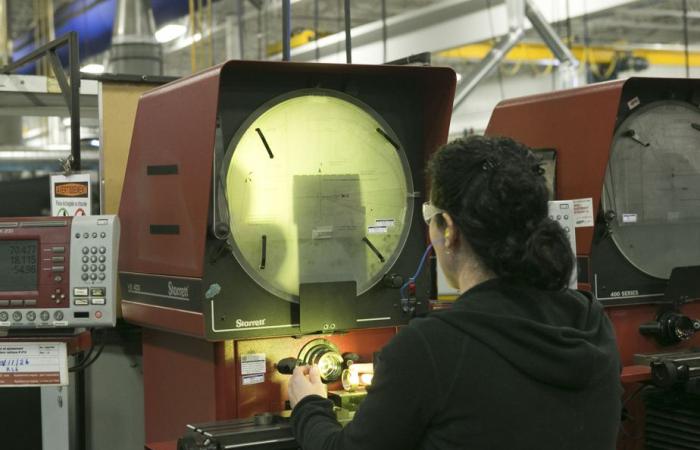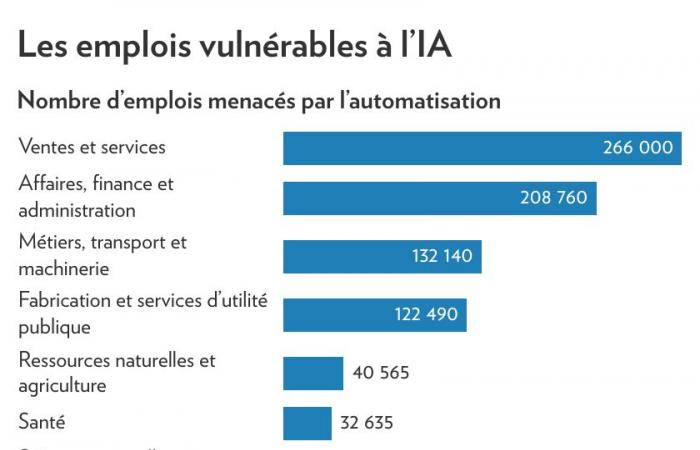Like all new technologies, the arrival of artificial intelligence in our lives raises fears of job losses in several sectors of activity. In Quebec, 810,000 people, or 18% of the total workforce, hold jobs vulnerable to the development of artificial intelligence, according to a study by the Institut du Québec.
Published at 6:00 a.m.
Few sectors spared
Artificial intelligence applications stand out for the speed with which they have been adopted, underlines Emna Braham, director of the Quebec Institute which carried out the study in collaboration with another research center, the Center for Future Skills.
Artificial intelligence has everything it takes to become a disruptive technology that will spare no profession or sector of activity, she underlined during an interview with The Press. The exceptions are perhaps teaching, social work and arts and culture, “less vulnerable because these activities require skills that are more difficult to computerize, such as emotional intelligence,” she says.
Salespeople, translators and accountants
The development of artificial intelligence makes it easier to accomplish cognitive tasks previously reserved for human beings. It is no longer just self-service checkouts in stores and ATMs that are taking the place of real-life employees. Activities such as table service in restaurants, machine operation in factories, translation and accounting will also be able to do without employees. In total, 96 professions are vulnerable to the increasing robotization enabled by artificial intelligence applications, the study identifies, the largest number of which are in the manufacturing sector.
New jobs will also be created in artificial intelligence applications, so massive job losses are unlikely. Some 67% of Quebec companies believe that artificial intelligence will have a neutral effect on employment, according to the study.
Diplomas that change everything
Not all jobs that don’t require a college degree are at high risk of being automated. Hairdressers, for example, are difficult to replace with a machine, unlike salespeople. Having a university degree is no guarantee of being spared from the automation of tasks either. University graduates are less vulnerable, but accountants, managers and coders, who generally went to university, are also at risk, the study notes.
Having a university degree, however, remains an advantage, as the skills acquired can be used in another profession. Translators, for example, can leverage their language expertise in teaching, a profession less vulnerable to automation.
According to the director of the Quebec Institute, we should not fear job losses so much as worry about at-risk workers who do not have the possibility of reorienting themselves in another profession. Some 27% of adults aged 25 and over work in sectors at risk of automation.
An opportunity for Quebec
For Quebec, whose economy suffers from an acute labor shortage, artificial intelligence is a rare opportunity to reduce recruitment problems and increase productivity.
For companies, this involves investments both in training to reallocate employees to tasks with higher added value and in equipment that allows tasks to be automated.
Unlike the general public, who quickly adopted artificial intelligence tools like ChatGPT, businesses will take longer to integrate these applications into their activities, predicts the Institut du Québec. In addition to in-depth reflection on the best use of technology, budgetary constraints and future regulations which must govern the use of artificial intelligence will slow down its adoption. Several years could therefore pass before the impact on jobs and business productivity is notable.
Quebec ahead?
Very few companies in Canada rely on artificial intelligence to produce goods and services. However, several companies are already using artificial intelligence tools. Quebec, which prides itself on being a leader in this area, perhaps has a head start if we rely on a survey which indicates that 12% of Quebec companies intend to adopt applications of artificial intelligence over the next year. This is more than the second highest rate in Canada, underlines one of the authors of the study, Anthony Migneault.
The study by the Institut du Québec indicates that Quebec is in the same situation as the other provinces in terms of the number of jobs threatened by artificial intelligence. The proportion of the total workforce at risk, 18%, is the same as in Ontario, Alberta and British Columbia.
Consult the study by the Institut du Québec







